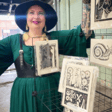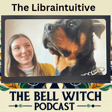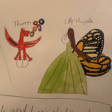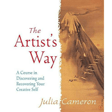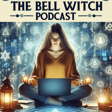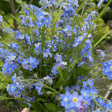Become a Creator today!Start creating today - Share your story with the world!
Start for free
00:00:00
00:00:01

Witchcraft and Herbalism
Bonus Episode.
This delightful spotlight episode of The Bell Witch Podcast is hosted by Lianne Marie, a kitchen with with a love for traditional witchcraft, ethical marketing and tea!
Jammed packed with bitesize witchcraft folklore, herbalism and witching in the 21st Century. You can find Lianne at
Butterflump – Ethical marketing support for small businesses
Butterflump (@butterflump) • Instagram photos and videos
PLEASE HELP THE SHOW GROW BY RATING/REVIEWING/FOLLOWING/SHARING
Music by Geoff Harvey of Pixabay
Edited by Swailes Friendly Green Witch instagram.com/friendlygreenwitch1111
Made with love and magic, distributed by Zencastr.
Trailer swaps welcome. Email [email protected]
Transcript
00:00:24
Speaker
you
Introduction to Leanne Marie's Plant Magic
00:00:30
Speaker
Hi I'm Leanne Marie and I'm a green witch or a kitchen witch. I'm particularly aligned with what I call work cunning which is plant knowledge. You had a wonderful episode recently with Swales and Louise where Louise talked about the power of poisons and how she's learned about the way poisons have been present throughout history and then for example homeopathy the poisons can be used in microdose formats to heal rather than harm
00:00:55
Speaker
So I'm not going to talk about poisons because you've already had the most fabulous episode on that. What I'm going to talk today is about plant knowledge and about plant healing. I'm also particularly interested in the history of this area of witchcraft.
Historical Evolution of the Witch Archetype
00:01:11
Speaker
and how the kind of archetype of the witch as a dangerous or scary or harmful character in mythology and stories and in history came about. So as you may know throughout history, wise women or kitchen witches were the first keepers of the hearth.
00:01:28
Speaker
They were very powerful, going right back to our stone and iron age times. Women were the first foragers. The archetype of the caveman leaving the woman at home with the children and going out and hunting me is totally bogus. We now have plenty of evidence to suggest that actually women were the foragers that were supporting their villages, their families. We know that women breed the first beer. We know this from cuneiform, which is literally the oldest writing in the world.
00:01:55
Speaker
Women baked the first bread, they made the first remedies, they advised their communities on every aspect of life from birthing to dying and all the healing required in between. They would be the mistresses of death which would lay people out and lead ceremonies to support families through grieving. These obviously varied from region to region because wherever in the world you are there are different traditions and rituals and ceremonies surrounding death and grieving.
Decoding Witch Symbols and Folklore
00:02:23
Speaker
So let's think about the symbols of a witch. These archetypes that we have in popular culture that we've come to know. They may be standing over a cauldron, for example. They may have a broom or a besom. They may have a cat. The cauldron is not a symbol for a scary old woman brewing poisons and nasty spells. It's just a common symbol of an alewife or a kitchen witch. Perhaps they're making a pot of soup.
00:02:48
Speaker
As somebody who's harnessing the power of plants, vegetables, herbs, spices to heal and to nourish, it's such a positive thing. But it's very easy to tell a different story which can make it sound sinister or scary. So if we take from example
00:03:05
Speaker
folklore. If we take the story of Hansel and Gretel, in this story the witch captures children, she fattens them up, she puts them into her oven and eats them and this myth actually is rooted in a misunderstanding of an ancient practice which we actually still use to this day in another farm through midwifery.
00:03:24
Speaker
So if there's a prematurely-born baby, they didn't have incubators the way we have now in, say, the 15th century. But what they did have is a barely-warm, almost-cool oven where a premature infant could be wrapped in blankets and placed inside to keep warm and to help them live. And I said the 15th century, but actually going back as far as the 13th century, this was a practice that midwives would do for prematurely-born babies.
00:03:51
Speaker
And it is understandable that at some point, some child in the household or some passing person has seen a midwife putting a baby in an oven and either completely misunderstood or maybe just liked the idea of turning it into a scary story. And then you have these legends that arise from everyday, quite innocent, simple activities of healing that are then used to undermine and harm women.
00:04:15
Speaker
So the symbol of the broom, this idea that witches fly on brooms, it's not to be taken literally. It's a coded reference to the use of hallucinogenics, which were called flying on them. Now cats, they're a particularly enduring symbol of the witch. But the idea of having a cat as a familiar, and the idea that you can identify a witch because they were a woman living alone with a cat at some point in history. Oh how awful, an unmarried woman with a pet.
00:04:41
Speaker
Well, there have been plagues and sicknesses which raged through villages at so many points in history. And if it was observed that many of the women who weren't affected by these plagues or diseases, and perhaps were active in healing them, you know, by a cynical person, they may divine that they are evil or they must have made everyone sick for their own profit. And in reality, it's just a simple practical decision that one might make in a household. Having a cat means you don't have rodents getting into your kitchen ingredients and soiling them.
00:05:11
Speaker
passing diseases through the household. We know the bubonic plague, for example, was carried by rats. So having a cat in your household is a way of being immune from diseases that might be killing everyone else. But it's just a practical decision. It doesn't mean that you're a witch. So if you take characteristics of people and twist them through stories which are intended to harm, or through ignorance and fear, you cast aspersions on wise women and work cutting practices, and we end up with things like witchcraft trials.
Women, Medicine, and Witchcraft
00:05:41
Speaker
It's very easy to forget the incredible work and the incredible knowledge that these women would have had and handed down through centuries and shared and for the most part not profited in from the way that medicine now is. I mean, it's a huge, huge industry. You've maybe heard many accusations against Big Pharma, particularly in America where they don't have a national health service like we do.
00:06:04
Speaker
But even in our country, pharmaceuticals are a massive, massive multi-billion pound industry. If you go into any chemist, even any supermarket or a pound shop, the shelves are lined with every possible conceivable type of remedy that once upon a time would have been derived from fresh ingredients. They would have been picked and made right there in front of you by a wise woman.
00:06:25
Speaker
Now we know that vitamins that we might buy from a chain like Boots The Chemist or Holland & Barrett, we know that they're stale, we know they're ineffective, we know they're filled with additives and fillers that aren't very good for us and are incredibly overpriced. You know, so what can we do?
00:06:40
Speaker
Once upon a time, having a nailment would have meant that you would make those remedies yourself, or you would go to somebody who knew about remedies, and perhaps give them a loaf of bread, or do some chores around the house for them, bring them some firewood, you know, in exchange for the remedy. But you would trust this person with your family's health.
00:06:57
Speaker
And this was the beginning of medicine as an industry. Women were excluded, declared witches, medicine became a science practiced by men for profit, women weren't allowed to study it for hundreds of years despite being the origins of it, and they're still facing barriers to success in healing fields to this day.
Ancient Herbal Practices and Modern Uses
00:07:16
Speaker
Now the oldest recipes we have written down are herbals. If you were to go to the British Museum, you can see your recipes are written down from 900 CE for the Nine Herbs Charm, which is, let me see, mugwort, watercress, plantain, nettle, betony, chamomile, crabapple and either chervil or fennel.
00:07:37
Speaker
So that's the nine herbs charm. In TCM, or traditional Chinese medicine, these remedies and practices go back thousands of years, as do those in Ayurvedic medicine. And these often involve taking energy from spices and eating particular combinations of foods, or excluding certain foods for optimal health.
00:07:57
Speaker
So that's just a little bit about, you know, what work cunning is and how it's kind of come through history and folklore to the place where I am right now. And the way I practice my craft of work cunning is to focus on infusions. So whether I'm creating infusions to breathe, to drink, to bathe in or clean my house with, I try and grow or forage my ingredients or buy them locally.
00:08:23
Speaker
So, once upon a time, actually less than 100 years ago, we wouldn't have gone to a supermarket, because they didn't exist, but we wouldn't have gone to a shop and bought a bottle of something that was made to have an incredibly long shelf life, be shipped all around the country or the world,
00:08:38
Speaker
has loads of synthetic fragrances in, we would have just simply made our own cleaning materials. And I've noticed recently that simmer pots have come into fashion, which is something I've been doing for a long time. And all it is really is boiling up herbs or flowers with salt and citrus, purifying the air in my home, shifting energy for clarity or calm or focus. And then you strain it when you're done. You add it to vinegar or use it neat to wipe down your kitchen surfaces.
00:09:08
Speaker
And this kind of idea that we have to buy multiple different products to clean with when for the most part you already have the ingredients in your cupboards at home, bicarbonate of soda and vinegar will clean just about anything. But there's not a whole lot of money to be made in bicarbonate of soda and vinegar so they, you know, mix together these terrible long life potions and sell them and ship them everywhere, trashing the planet and
00:09:34
Speaker
You know, we see time and time again all this knowledge we've had throughout history has become commercialised for profit. And it's often in ways that are harming people's health and harming the planet. We're now in a situation where ingredients have microplastics or they're in plastic packaging which leeches into the contents.
00:09:52
Speaker
It's destroying our planet, it's destroying us, it's disrupting our endocrine systems and making us sick.
Practical Herbal Remedies for Health
00:10:00
Speaker
The only way that this can stop, it can't really be reversed because it's hit a critical mass, but we can make conscious choices as individuals to try and rediscover this work, this knowledge of plants and remedies to take back some of our own power, I guess.
00:10:22
Speaker
So let me give you some examples. If we move on to some common healing herbs that are fairly accessible, whether you want to go out and forage them, ensuring of course if this is something you're new to that you use a book or a reliable app that can help you safely identify plants and learn their common uses. So let's think. Common ailments you might have. If you have issues with breathing from allergies or asthma to the common cold, I mean it's
00:10:48
Speaker
We're just beginning with hay fever and allergy season. There's a lot of tree pollen about and stuff and pollution. So if you're having issues with breathing, you might want to take hyssop, eucalyptus, nettle, elderflower, meadow sweet, or maybe if it's more like you have a cold or an allergy and you have a lot of mucus. I mean, first of all, mucus is pretty helpful. It's designed to trap allergens and stop them from getting into our lungs.
00:11:14
Speaker
But, you know, if you're really, really struggling and want to dry up some of that mucus, you could take elderflower or mallowroot. But if you're female, it will leave your vagina dryer than the desert for a few days. So, you know, bilube. If you have inflammation, I would first of all suggest you look at the root cause of that inflammation.
00:11:37
Speaker
which is likely to be stress because we know that stress causes inflammation. And the majority of people who have conditions such as arthritis, for example, or cellulitis, that's as a result of stress in the body, and it comes out as inflammation. And there are things you can do to ease those symptoms, but the root cause of reducing that stress needs to be addressed. So if we're looking at easing the symptom of inflammation, you'd be looking at lemongrass, nettle again. Oh, nettle's so powerful.
00:12:07
Speaker
Jinko, dandelion leaf, sage, elderflower, meadow sweet, skullcap, motherwort. The majority of health food shops, and I am not talking about Holland and Barra, again the ingredients you get in those kind of chains are going to be old, stale, not as powerful as things you can pick yourself. Or buy from independent health food shops that gather it and store it properly and usually sell it fresh. So how about
00:12:33
Speaker
How about if you need to focus? You could go for caffeine, and that'll narrow your blood vessels and give you a rush of energy, but you could also take jinco or dandelion root, or you could drink sage tea, which also really helps with memory and brain fog. If you've got stuff going on with your tummy or with your liver, then you want dandelion root, dandelion leaf, fennel, meadow sweet, valerian, chamomile, lemon balm.
00:12:58
Speaker
maybe not valerian if it's your liver though. If you're stressed or feeling anxious or struggling to sleep, nettle, once again, can you tell how much I love nettles? So nettle, valerian, skullcap, motherwort, lemon balm, lavender, these are all great for if you're feeling stressed. Most of them work to lower your blood pressure, which is incredibly helpful if you're stressed.
00:13:26
Speaker
But if you suffer from low blood pressure, then these are ingredients that you wouldn't want to take. So this is where learning what the impact of these herbs can do is really necessary.
00:13:40
Speaker
Okay, if like me, you're perimenopausal or you suffer with rancid periods or fibroids, you can drink motherwort tea, ladies' mantle, that's a really good one, fennel, chamomile, raspberry leaf, you can also take CBD oil for inflammation as well. So how do I come to this knowledge? Well, it's something that can be handed down to you. It's something you can learn from books. It's also something that can come to you through your instincts.
00:14:08
Speaker
I tend to make healing things for myself and my family and people that I know. I don't do it for profit because I already have a business that takes care of that. But it's because I know the people that I make things for.
00:14:24
Speaker
I have this instinctive knowledge about which things will be helpful because I know them. So I reeled off, for example, for inflammation, probably six or seven different herbs, but I wouldn't take them all at once. I'd probably choose one or two that are the most relevant to the way my body works or the way my child's body works or to the tastes or smells that I or they like, because these things are all connected.
Intuition in Plant Knowledge
00:14:50
Speaker
As you may know, children, when they're learning to eat, are incredibly instinctual. They will avoid foods that they're allergic to quite often if they're presented in the form of raw ingredients. Obviously, if they're part of something that's been processed, they're not going to know what it is, their senses are not going to be very helpful, but, you know, you give a child a strawberry that's allergic to strawberries, they probably won't eat it.
00:15:14
Speaker
Anyway, so the instincts that we have, if we can tap into them and hone them, it's very possible that you can go through a journey of becoming cunning and developing that work cunning, that plant knowledge. So another example is, if I'm really struggling with a kind of gloomy melancholy or perhaps feeling a bit of situational depression,
00:15:35
Speaker
I'm very drawn to drinking a particular tea. It's called Earl Grey Cream. It's a vanilla-based Earl Grey Tea Leaf. And it's not that I need the caffeine. It's that the vanilla is incredibly comforting and uplifting. And just the scent of it, just the taste of it, it's helping lift that kind of depression that I'm feeling.
00:15:54
Speaker
So if I'm finding life a bit busy and chaotic and I'm not taking the right time to meditate, once I finally realise I'm neglecting that part of myself, I'll often make a tea to help me connect with my breath and to really enhance that meditation. So I might take eucalyptus, I might take lemongrass or linden, I might steep them for 10 minutes or so with some manuka honey and that'll really elevate my meditation.
00:16:20
Speaker
By the way, if you're heartbroken, feeling your feelings while drinking linden tea is so helpful. There are loads of ingredients like that that are really stabilising when you're going through something stressful. If I'm a bit overworked, I might have chamomile, fennel tea, lemon balm. Although I can't bear the taste of passion flower, that would also be quite effective for stress and overwhelm.
Exploring Herbs Through Sensory Experiences
00:16:46
Speaker
So the key is to learn by smelling, by tasting, by really tuning into the ingredients and how they speak to you. That's how you're going to learn what's going to be helpful for you and in what combination. So I would encourage and urge you to give this a try. Again, make sure you just don't go running out into the wild picking anything green. Maybe start with one ingredient and you know I'm going to recommend nettle and see how you go.
00:17:12
Speaker
If you don't want to pick nettles and rinse them and brew them into tea or turn them into soups, I can't think why you wouldn't want to, but if you don't want to, you can chop them like herbs and put them into bread, you can wrap cheese in them and preserve them in oil. Nettles are plants that are so good for you and they have a million different uses.
00:17:34
Speaker
But as I say, if you're not into drinking herbal teas, you can consider that the skin is in fact the biggest organ on your body. You can bathe in herbs and flowers and selective spices. You have to choose them carefully because there are some ingredients that will cause irritation when you put them on your skin or inhale them. But there are loads of different ways to enjoy the benefits of plants and their energy.
00:17:56
Speaker
So you could start by adding more fresh herbs to your diet. You could start by growing them. I use both fresh and dried herbs in my practice. With lemon balm or mint or sage, there are some days where I want to grind up those fresh leaves and make tea with them.
00:18:12
Speaker
And there are other days where you know I just want to have them dried, put another flavour like fennel seed or rose in for something a bit more mellow and that's maybe what I need instead. And it will be the same for you once you start. I really hope this was helpful and interesting to you. And I really thank you for your time.
Connecting with Leanne Marie
00:18:31
Speaker
And if you want to come and find me, you can find me at Butterflump. And I'm going to wish you good night. Take care. Blessed be.
00:19:00
Speaker
you

